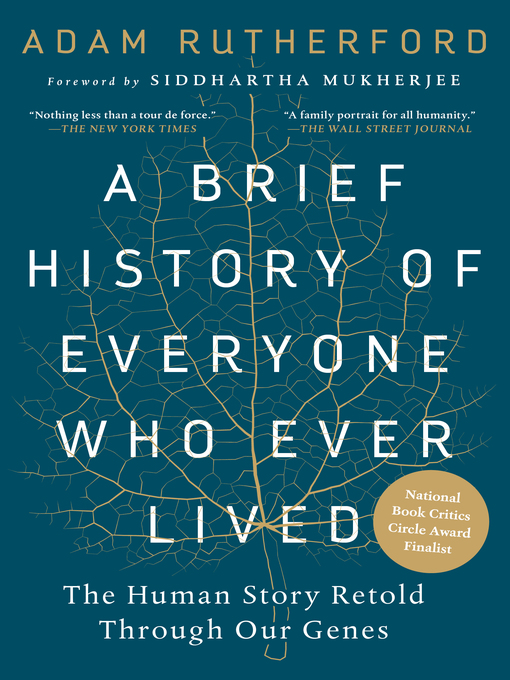
A Brief History of Everyone Who Ever Lived
The Human Story Retold Through Our Genes
فرمت کتاب
ebook
تاریخ انتشار
2017
نویسنده
Siddhartha Mukherjeeناشر
The Experimentشابک
9781615194186
کتاب های مرتبط
- اطلاعات
- نقد و بررسی
- دیدگاه کاربران
نقد و بررسی

September 1, 2017
Human genome studies indicate the history of our species is a tangled one. Our ancestors not only inbred frequently but also interbred with Neanderthals, Denisovans, and perhaps other early hominids yet unidentified. As Rutherford (Creation) notes, for Homo sapiens, "there was no beginning, and there are no missing links." In addition, while early genetic researchers interpreted human variation through a Eurocentric and often racist lens, contemporary molecular genetics reveals "we all are a bit of everything, and we come from all over." The author, however, has a clear inclination toward European, particularly British, incidents and examples. At times, Rutherford succumbs to editorializing on peripheral topics, including creationism, epigenetics, and genetic determinism, but he continues to be a witty writer throughout, effectively using typography to illustrate and explain genetic concepts. Included is a brief glossary of genetic terms. VERDICT By turns amusing and provocative, this book, which may bruise the egos of a few genealogists, will appeal to both popular and technical science readers.--Nancy R. Curtis, Univ. of Maine Lib., Orono
Copyright 2017 Library Journal, LLC Used with permission.

Starred review from August 21, 2017
British geneticist Rutherford (Creation) looks closely at the new field of genomics, scrutinizing the voluminous data being generated by researchers and what it says about us and our ancestors. Methodologically, he seeks to introduce genomics into older fields, “namely history, archaeology, paleoanthropology, medicine, and psychology.” For example, close study of the genetic composition of living and dead individuals demonstrates that, though the Vikings controlled much of England for 200 years, they rarely reproduced with the people they subjugated. Similar analysis, Rutherford claims, leads scholars to believe that a single population coming across the Bering Strait 24,000 years ago should be seen as the ancestors of all indigenous people in North and South America. Rutherford also explains why race isn’t a valid concept scientifically: “I am unaware of any group of people on Earth that can be defined by their DNA in a scientifically satisfactory way.” He argues persuasively that much of what is known about genetics is critical at the population level but much less so at the individual level, asserting that our ignorance has led to a “swing from genetic determinism to genetic denialism.” Rutherford raises significant questions and explains complex topics well, engaging readers with humor and smooth prose. Agent: PJ Mark, Janklow & Nesbit.

August 15, 2017
An enthusiastic history of mankind in which DNA plays a far greater role than the traditional "bones and stones" approach, followed by a hopeful if cautionary account of what the recent revolution in genomics foretells.According to British geneticist and science writer Rutherford (Creation: How Science Is Reinventing Life Itself, 2013), "we have literally thousands of ancient, hardened bones, found all around the world; many in the nursery of the human story in eastern Africa, many in Europe, and the more we look the more we find." They reveal clues about how our ancestors looked, hints about their behavior, and vague, contradictory hypotheses about their relation to our species. Deciphering DNA from these relics turns up more specific information about "how our evolution has proceeded." Neanderthals were close relatives. They separated from a common ancestor around 500,000 years ago and met and interbred with us throughout Eurasia, dying out 30,000 years ago and leaving a small percentage of their DNA in ours. Amazingly, DNA from a single finger bone uncovered another subspecies, the Denisovans, which wandered Asia at the same time, leaving a sprinkling of DNA in Pacific Islanders and Australian Aborigines. Turning to the present, Rutherford recounts this century's spectacular discoveries in genomics, pausing regularly to grind axes. For readers who wonder if racism has any basis in genetics, he explains at length that it hasn't. He examines companies that offer to analyze an individual's DNA and reveals why many of their claims are nonsense. Casting doubt on the steady stream of media announcements that scientists have discovered the gene for...addiction, homosexuality, height, anxiety, obesity, etc...the author emphasizes that dramatic advances in human well-being through genomics are guaranteed, if not quite yet. "Life is the accumulation and refinement of information embedded in DNA," writes Rutherford. "We are the data." Often quirky but thoughtful--solid popular science.
COPYRIGHT(2017) Kirkus Reviews, ALL RIGHTS RESERVED.

























دیدگاه کاربران